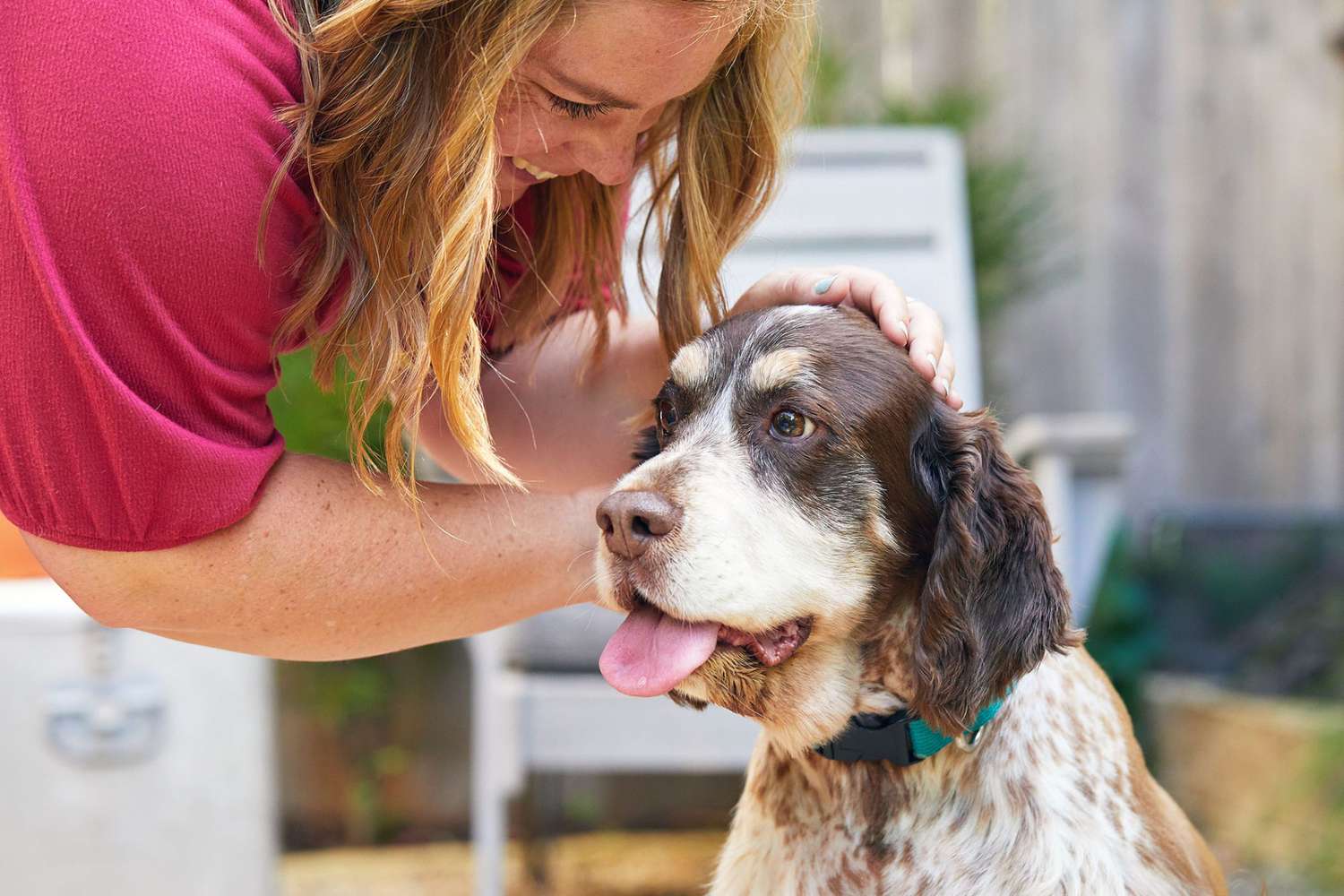Home>Health & Wellness>Behavior & Cognitive Care>Why Is My Senior Dog Barking All The Time


Behavior & Cognitive Care
Why Is My Senior Dog Barking All The Time
Published: February 1, 2024
Discover effective behavior and cognitive care tips for your senior dog. Learn why your older dog may be barking excessively and how to address this issue.
(Many of the links in this article redirect to a specific reviewed product. Your purchase of these products through affiliate links helps to generate commission for Pawsomeoldies.com, at no extra cost. Learn more)
Table of Contents
- Introduction
- Understanding the reasons behind excessive barking in senior dogs
- Medical issues that may cause senior dogs to bark excessively
- Behavioral issues that may cause senior dogs to bark excessively
- Environmental factors that may contribute to excessive barking in senior dogs
- Tips for managing and addressing excessive barking in senior dogs
- Conclusion
Introduction
Senior dogs are often cherished members of the family, providing years of love, loyalty, and companionship. As our furry friends age, they may undergo various physical and behavioral changes, including an increase in barking. While occasional barking is a natural form of canine communication, excessive barking in senior dogs can be concerning for pet owners. Understanding the underlying reasons behind this behavior is crucial for providing appropriate care and support for our aging canine companions.
In this comprehensive guide, we will delve into the factors that may contribute to excessive barking in senior dogs, ranging from medical issues to behavioral and environmental triggers. By gaining insight into the potential causes of this behavior, pet owners can take proactive measures to address their senior dog's needs and enhance their overall well-being.
Throughout this article, we will explore the intricate interplay between a senior dog's physical health, emotional state, and environmental surroundings, shedding light on the multifaceted nature of excessive barking in aging canines. Additionally, we will provide practical tips and strategies for managing and addressing excessive barking in senior dogs, empowering pet owners to navigate this common challenge with empathy and expertise.
Join us on this enlightening journey as we unravel the complexities of senior dog behavior, uncovering the underlying factors that may contribute to excessive barking and offering valuable insights into promoting a harmonious and fulfilling relationship with our beloved senior canine companions.
Read more: Why Does My Senior Dog Pace All The Time?
Understanding the reasons behind excessive barking in senior dogs
Senior dogs, like humans, undergo a myriad of physical and cognitive changes as they age. These transformations can manifest in various behaviors, including an increase in barking. Understanding the underlying reasons behind excessive barking in senior dogs is essential for pet owners to provide the best possible care and support for their aging canine companions.
One of the primary factors contributing to excessive barking in senior dogs is diminished sensory perception. As dogs age, their hearing and vision may decline, leading to heightened sensitivity to environmental stimuli. This heightened sensitivity can trigger excessive barking in response to seemingly mundane sounds or movements, as senior dogs strive to make sense of their surroundings and communicate their discomfort or confusion.
Moreover, cognitive decline in senior dogs can play a significant role in excessive barking behavior. Canine cognitive dysfunction, often referred to as doggy dementia, can lead to disorientation, anxiety, and altered sleep-wake cycles, all of which may contribute to increased vocalization. Senior dogs experiencing cognitive decline may bark more frequently as a result of confusion, fear, or the inability to process familiar stimuli, signaling the need for compassionate understanding and tailored support from pet owners.
Additionally, the natural aging process can bring about physical discomfort and pain in senior dogs, which may manifest as excessive barking. Conditions such as arthritis, dental issues, or other age-related ailments can cause distress and prompt senior dogs to vocalize their discomfort. By vocalizing their pain, senior dogs may seek comfort and relief, signaling to pet owners the importance of proactive veterinary care and pain management to alleviate their beloved companion's suffering.
Furthermore, the emotional well-being of senior dogs can influence their barking behavior. Changes in their living environment, routine, or social dynamics can induce stress and anxiety, prompting excessive vocalization as a coping mechanism. Senior dogs may bark more frequently when feeling lonely, insecure, or unsettled, emphasizing the significance of providing a nurturing and reassuring environment to support their emotional needs.
In essence, the reasons behind excessive barking in senior dogs are multifaceted, encompassing sensory changes, cognitive decline, physical discomfort, and emotional distress. By recognizing and addressing these underlying factors, pet owners can cultivate a deeper understanding of their senior dog's behavior and implement tailored strategies to enhance their well-being and quality of life.
Medical issues that may cause senior dogs to bark excessively
Senior dogs, like their human counterparts, are susceptible to a range of medical conditions as they age. These health issues can significantly impact their behavior, including excessive barking. Understanding the potential medical issues that may contribute to this behavior is crucial for pet owners to provide timely intervention and compassionate care for their aging canine companions.
One common medical issue that can lead to excessive barking in senior dogs is pain and discomfort associated with age-related conditions. Arthritis, a prevalent ailment in aging dogs, can cause joint pain and stiffness, prompting increased vocalization as a means of expressing distress. Similarly, dental problems, such as periodontal disease or tooth decay, can lead to oral discomfort, prompting senior dogs to bark more frequently in response to their physical pain.
Furthermore, cognitive dysfunction, often referred to as canine cognitive dysfunction (CCD) or doggy dementia, can contribute to excessive barking in senior dogs. CCD is characterized by cognitive decline, disorientation, and behavioral changes, which may manifest as heightened vocalization. Senior dogs experiencing cognitive decline may bark excessively due to confusion, anxiety, or the inability to process familiar stimuli, underscoring the need for compassionate understanding and specialized care.
Additionally, sensory impairments, such as hearing loss and vision deterioration, can play a role in excessive barking behavior among senior dogs. Diminished sensory perception can lead to heightened sensitivity to environmental stimuli, causing senior dogs to vocalize more frequently in response to perceived threats or unfamiliar sounds. Moreover, age-related changes in the nervous system can amplify a senior dog's startle response, leading to increased barking as a reactive behavior.
Moreover, endocrine disorders, such as hypothyroidism or Cushing's disease, can impact a senior dog's hormonal balance, potentially triggering changes in behavior, including excessive vocalization. These conditions can disrupt the dog's internal equilibrium, leading to heightened anxiety, restlessness, and increased barking as a manifestation of their physiological imbalance.
In essence, a myriad of medical issues, including pain from age-related conditions, cognitive dysfunction, sensory impairments, and endocrine disorders, can contribute to excessive barking in senior dogs. By recognizing the potential impact of these medical issues on a senior dog's behavior, pet owners can prioritize regular veterinary check-ups, proactive pain management, and tailored interventions to address their beloved companion's medical needs and promote a comfortable and fulfilling senior years.
Behavioral issues that may cause senior dogs to bark excessively
Behavioral issues can significantly contribute to excessive barking in senior dogs, often stemming from changes in their cognitive and emotional well-being as they age. Understanding the behavioral factors that may prompt senior dogs to bark excessively is essential for pet owners to address these issues with empathy and tailored support.
One prominent behavioral issue that can lead to excessive barking in senior dogs is anxiety and fear. As dogs age, they may become more susceptible to anxiety due to changes in their environment, routine, or social dynamics. Senior dogs experiencing anxiety may resort to excessive barking as a coping mechanism, expressing their unease and seeking reassurance from their owners. Additionally, separation anxiety, commonly observed in senior dogs, can trigger heightened vocalization when they feel distressed or isolated, underscoring the need for compassionate understanding and gradual desensitization techniques to alleviate their anxiety.
Moreover, cognitive decline, often associated with canine cognitive dysfunction (CCD), can prompt behavioral changes that manifest as excessive barking. Senior dogs experiencing cognitive decline may exhibit disorientation, confusion, and altered sleep-wake cycles, leading to increased vocalization as a result of their cognitive impairment. This behavioral manifestation underscores the importance of providing a structured and familiar environment for senior dogs, along with cognitive enrichment activities to support their cognitive function and minimize distress-induced barking.
Additionally, boredom and understimulation can contribute to excessive barking in senior dogs. As dogs age, their activity levels and stimulation requirements may change, and a lack of mental and physical engagement can lead to boredom and restlessness, prompting increased vocalization. Providing senior dogs with interactive toys, gentle exercise, and mental enrichment activities can help alleviate boredom and provide healthy outlets for their energy, reducing the likelihood of excessive barking due to understimulation.
Furthermore, changes in social dynamics, such as the introduction of a new pet or the absence of a familiar companion, can trigger excessive barking in senior dogs. Feelings of insecurity, territorial behavior, or the need for attention can prompt senior dogs to vocalize more frequently as they navigate shifts in their social environment. Understanding and addressing these changes with patience and positive reinforcement can help senior dogs adapt to new social dynamics and minimize excessive barking associated with emotional distress.
In essence, behavioral issues such as anxiety, cognitive decline, boredom, and changes in social dynamics can contribute to excessive barking in senior dogs. By recognizing these behavioral factors and implementing tailored strategies to address them, pet owners can provide compassionate support and enhance the emotional well-being of their senior canine companions, fostering a harmonious and fulfilling bond in their golden years.
Environmental factors that may contribute to excessive barking in senior dogs
Environmental factors play a pivotal role in shaping the behavior of senior dogs, and they can significantly contribute to excessive barking. As our canine companions age, their sensitivity to environmental stimuli, changes in routine, and social dynamics can influence their vocalization patterns. Understanding the environmental factors that may prompt excessive barking in senior dogs is essential for pet owners to create a supportive and nurturing living environment for their aging furry friends.
One prominent environmental factor that can contribute to excessive barking in senior dogs is heightened sensitivity to noise. As dogs age, their hearing may become more acute, making them more reactive to sounds that were previously insignificant. Common environmental noises, such as doorbells, car honks, or household appliances, can trigger excessive barking in senior dogs as they attempt to process and respond to these auditory stimuli. Additionally, unfamiliar or sudden noises in the environment can startle senior dogs, prompting them to vocalize as a form of alert or distress signal.
Moreover, changes in the living environment or routine can impact a senior dog's barking behavior. Relocation to a new home, alterations in household dynamics, or modifications in daily routines can induce stress and anxiety in senior dogs, leading to increased vocalization. Senior dogs may express their discomfort or disorientation through excessive barking as they adapt to unfamiliar surroundings or cope with changes in their established routines. Providing a stable and predictable environment, along with gradual acclimatization to changes, can help mitigate excessive barking associated with environmental upheavals.
Furthermore, social dynamics within the household can influence a senior dog's vocalization patterns. The introduction of a new pet, the absence of a familiar companion, or shifts in family dynamics can trigger emotional distress in senior dogs, prompting them to bark excessively. Feelings of insecurity, territorial behavior, or the need for attention can manifest as heightened vocalization in response to changes in their social environment. Patiently addressing these social dynamics and providing reassurance can help senior dogs navigate these transitions with reduced barking behavior.
In essence, environmental factors such as heightened sensitivity to noise, changes in the living environment, and shifts in social dynamics can contribute to excessive barking in senior dogs. By recognizing and addressing these environmental influences, pet owners can create a calming and supportive atmosphere for their senior canine companions, minimizing stress-induced vocalization and fostering a tranquil and enriching living environment for their beloved furry friends.
Read more: Why Is My Senior Dog Biting?
Tips for managing and addressing excessive barking in senior dogs
-
Consult with a Veterinarian: Schedule a comprehensive veterinary examination to assess your senior dog's physical health and potential underlying medical issues contributing to excessive barking. Addressing any pain, discomfort, or age-related ailments is crucial for managing their vocalization behavior effectively.
-
Create a Calming Environment: Designate a quiet and comfortable space for your senior dog, equipped with familiar bedding and soothing elements to minimize environmental stressors that may trigger excessive barking. Consider using calming pheromone diffusers or soothing music to promote relaxation.
-
Mental and Physical Enrichment: Engage your senior dog in gentle mental stimulation and physical activities tailored to their age and mobility. Interactive toys, puzzle feeders, and short, leisurely walks can help alleviate boredom and provide healthy outlets for their energy, reducing the likelihood of excessive barking due to understimulation.
-
Establish a Consistent Routine: Maintain a predictable daily schedule for feeding, exercise, and rest to provide structure and stability for your senior dog. Consistency in routine can help minimize anxiety and confusion, reducing the potential triggers for excessive barking.
-
Behavioral Training and Positive Reinforcement: Utilize positive reinforcement techniques to address excessive barking behavior. Reward calm and quiet behavior with treats and verbal praise, gradually shaping their response to environmental stimuli and promoting a quieter demeanor.
-
Address Separation Anxiety: If your senior dog experiences separation anxiety, implement gradual desensitization strategies to acclimate them to periods of alone time. Practice short departures and returns, gradually extending the duration to alleviate distress-induced barking.
-
Comfort and Reassurance: Provide ample comfort and reassurance to your senior dog, especially during times of heightened anxiety or confusion. Gentle petting, soothing verbal cues, and a reassuring presence can help alleviate emotional distress and reduce excessive vocalization.
-
Professional Behavioral Consultation: Consider seeking guidance from a professional dog behaviorist or trainer experienced in senior dog care. Their expertise can provide tailored strategies and personalized support to address excessive barking based on your senior dog's unique needs and behavioral triggers.
By implementing these tips and strategies, pet owners can effectively manage and address excessive barking in senior dogs, promoting a tranquil and supportive environment that enhances their well-being and fosters a harmonious bond in their golden years.
Conclusion
In conclusion, the complexities of excessive barking in senior dogs encompass a multifaceted interplay of physical, behavioral, and environmental factors. As our beloved canine companions age, they may experience a myriad of changes that influence their vocalization patterns, signaling the need for compassionate understanding and tailored support from pet owners. By delving into the underlying reasons behind excessive barking in senior dogs, we gain valuable insights into their unique needs and the strategies to enhance their well-being in their golden years.
Understanding the impact of sensory changes, cognitive decline, and physical discomfort on a senior dog's barking behavior highlights the importance of proactive veterinary care, pain management, and cognitive enrichment activities. By addressing these medical factors, pet owners can alleviate their senior dog's distress and promote a comfortable and fulfilling quality of life.
Moreover, recognizing the behavioral issues such as anxiety, cognitive decline, boredom, and changes in social dynamics underscores the significance of creating a supportive and nurturing living environment for senior dogs. Implementing tailored strategies, including mental and physical enrichment, consistent routines, and positive reinforcement, can help mitigate excessive barking and foster emotional well-being in aging canine companions.
Additionally, acknowledging the environmental influences, such as heightened sensitivity to noise, changes in the living environment, and shifts in social dynamics, empowers pet owners to create a calming and reassuring atmosphere for their senior dogs. By minimizing stress-induced vocalization and providing a tranquil living environment, pet owners can enhance the overall quality of life for their aging furry friends.
In essence, the journey of understanding and addressing excessive barking in senior dogs is a testament to the unwavering bond between pet owners and their aging canine companions. By embracing empathy, patience, and proactive care, pet owners can navigate this common challenge with grace and expertise, fostering a harmonious and fulfilling relationship with their beloved senior dogs. As we embark on this enlightening journey, let us continue to prioritize the well-being and happiness of our senior canine companions, celebrating the enduring love and companionship they bring to our lives.














